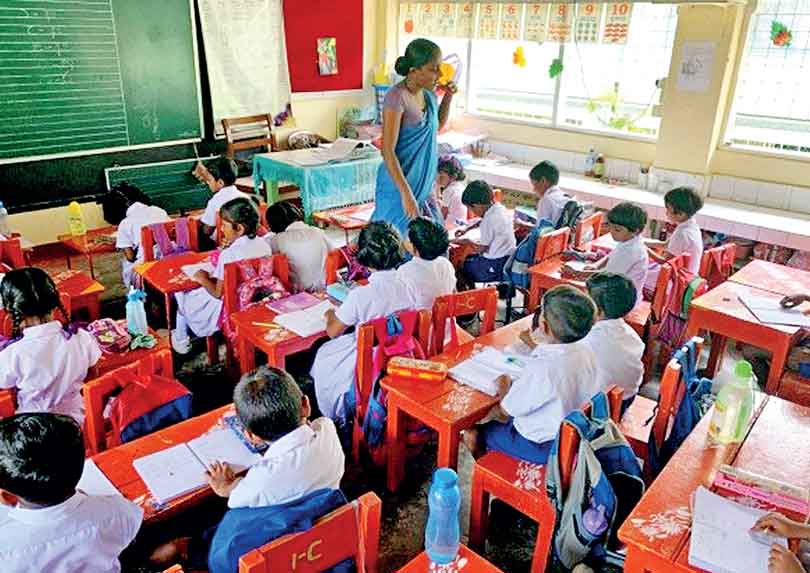Monday Feb 16, 2026
Monday Feb 16, 2026
Tuesday, 10 December 2024 01:35 - - {{hitsCtrl.values.hits}}

The larger problem is that there are no certification requirements for teachers in Sri Lanka
 Rice shortages and the Maaveerar celebrations in the north and reporting of the same in the south are issues that took centre stage last week. These are issues that shape a practical ideology for the new Government as it transitions from election promises to the reality of governing. As for rice shortages, it is time for the Cabinet to put its heads together and learn about the limits of State intervention in the marketplace and adopt appropriate responses. In the second case, the Government can use the situation as an opportunity to form a new narrative on our race relations.
Rice shortages and the Maaveerar celebrations in the north and reporting of the same in the south are issues that took centre stage last week. These are issues that shape a practical ideology for the new Government as it transitions from election promises to the reality of governing. As for rice shortages, it is time for the Cabinet to put its heads together and learn about the limits of State intervention in the marketplace and adopt appropriate responses. In the second case, the Government can use the situation as an opportunity to form a new narrative on our race relations.
While these big issues should take centre place in the new Government’s affairs, a government can get hobbled by retail issues. Leaked exam questions, school supplies, and unemployed graduates, all to do with education, were some such issues that took the centre stage last week. I wish to argue that these are issues that should be delegated or decentralised so that the Minister of Education can address the larger issue of the direction of education for the next five years. Let’s look at the three ‘minor’ issues in more detail.
Three leaked questions in the Grade five scholarship examination
Soon after the Grade five scholarship examination (G5SE) held on 15 September it was revealed that three of the questions in the exam had been leaked. It was headline news. The minister correctly appointed a committee to investigate the matter and they recommended that marking be carried out without the three leaked questions. Then the parents approached the President, and he ruled that the paper marking should be paused for two weeks. The parents also went to the Supreme Court (SC) and the Court issued an interim order on 18 November preventing authorities from continuing with the marking. Few days ago, the Attorney General informed the SC of the Government’s decision to stay with the recommendation to carry out the marking process giving full marks to the subject three questions to all candidates. The AG’s submission will be taken up for hearing by the SC on 11 December.
While we await the SC’s decision, it is time to reflect on this sequence of events.
Soon after the news of the leak the ministry reported that a committee comprising local and international experts was appointed to probe the leak of the three questions in the examination paper. On 30 September, the committee made its recommendation, but even after two months since that decision, we are still awaiting the SC decision on their recommendation.
These delays, I believe, are to do with the ad hoc nature of these committees appointed and lack of trust in them by the public. The 2022-24 Ranil Wickremesinghe Government was severely criticised by the parties now in Government for not divulging the details of the committee of experts appointed to draft a National Education Policy Framework (NEPF), and rightly so. The same is true for the present case. The Government should have been open about these experts they consulted or better still the ministry should have a permanent in-house advisory body of experts supported by a research unit.
The present National Education Commission, the authority with responsibility of education policy, is a failed institution. With the exception of its first document published in 1992, their policy documents have been ignored by authorities. The auditor general is on record questioning the money spent on drafting the policy documents.
The reason for the irrelevance of the NEC is apparent in its structure and its mission. It is established as a stand-alone policy formulating body to advise the President. The contributors to its latest national policy framework policy 2020-2030 show why NEC’s policy prescriptions are not taken seriously. More than 90% of its contributors are academics in the public sector universities who as providers of education have a conflict of interest in being the sole determinants of national policy on education.
Absent are employers or other non-governmental actors who are affected by the quality of the output of our education system. Even if the NEC is more representative, the notion that it can present a government with policy direction is a flawed idea. An incoming government should have the flexibility to frame its own policies. Experts should be sensitive to the policy priorities of an incumbent government.
The ministry urgently needs to set up an advisory body which works closely with the ministry and provide evidence-based advice to the ministry while being responsive to the socio-political environment.
Families unable to purchase stationery for the schooling of their children
The Cabinet decision of 02-12-2004 also concerned a survey conducted by the Department of Census and Statistics revealing that adverse effects of the economic crisis have had a significant negative impact on the education of 55% of school children and that 29% of the affected children have either reduced or completely stopped purchasing school stationery. In light of that information, the Cabinet decided to provide an allowance of Rs. 6,000 per child for the children of Aswesuma Beneficiary families through the Welfare Benefits Board and extend the allowance through the Ministry of Education who fall into the categories of parentless children not included in the Aswesuma program, children from families where mother or father is disabled, all school age children in orphanages and children who have been left destitute, due to special circumstances.
This decision appears to be a good one at first sight, but it is based on survey data collected in August 2023. The situation may have improved or worsened since then. Knowledge of actual requirements is best available to those closest to these children. In fact, there is a regulation for forming committees at school level to follow on children’s attendance and correct for any shortcomings that are affecting the attendance. To quote:
“In the event that [the Provincial director of education] is satisfied that the parent of a child is unable to provide the child with the basic requirements for the schooling of such child, arrange for the provision of such requirements wherever possible” [School Attendance Committee Gazette No. 1963/30 - April 20, 2016]”.
An earlier regulation (School Attendance Committee Gazette No. 1003/5 - November 25, 1997) assigned the responsibility to the public administration authority at the divisional secretariat division (or DSD) level but in the later version education authorities at the education division level are perceived to be better positioned to deliver results.
Whatever the final structure, it is clear that we have mechanisms at school or divisional level to track and follow up on children not attending school due to economic or other difficulties and address their needs without waiting for ad hoc national surveys to catch them as a generalised statistic which reaches the national government after a delay.
Therefore, the next order of business for the Cabinet should be to increase the welfare budget for the provincial department of education with the requirement that they activate school attendance committees and attend to children’s needs at a local level, more efficiently and effectively, before they become national headlines.
Demands for teaching appointments by 15,800 development officers in schools
The demonstration for demands by the development officers took a violent turn on 2 December prompting a Cabinet decision to appoint a committee to investigate the general problem of ad hoc appointments to Government. As the Cabinet decision dated 02-12-2024 noted, more than 150,000 graduates including the Development Officers have been recruited to Government service through various schemes in seven occasions from the year 1994 to 2020. These appointments have been made without a proper evaluation of the skills and professional qualifications of the recruits, of which more than 15,800 Development Officers are engaged in teaching in National and Provincial schools. They are demanding to be appointed as teachers apparently without doing a test that has been prescribed for the purpose.
The larger problem is that there are no certification requirements for teachers in Sri Lanka. In the UK you need a Qualified Teacher Status (QTS) from the Teaching Regulation Agency (TRA) to teach. In Sri Lanka, the doctors need to be certified by Sri Lanka Medical Council to practice as doctors and the nurses by the Sri Lanka Nursing Council. Even beauticians are required to have an NVQ qualification to register their businesses with their relevant divisional secretariat division. A National Teacher Council for certification of teachers, maintaining professional standards and advising Government on all teacher related issue is long overdue in Sri Lanka. If we had such authority and a requirement that personnel practicing as teachers need to be certified by the National Teachers Council, politicians will not be able use schools as places to gain political mileage at the expense of the welfare of students.
If the Ministry of Education is to be effective in the long run, it needs to delegate and/or decentralise its functions beginning with the (1) Establishing of a credible advisory body replacing the present National Education Commission to advise the minister on technical issues; (2) Reactivating school and division level Compulsory School Attendance Committees to resolve children’s welfare issues locally and; (3) Establishing a National Teacher Council to deal with teacher related issues.